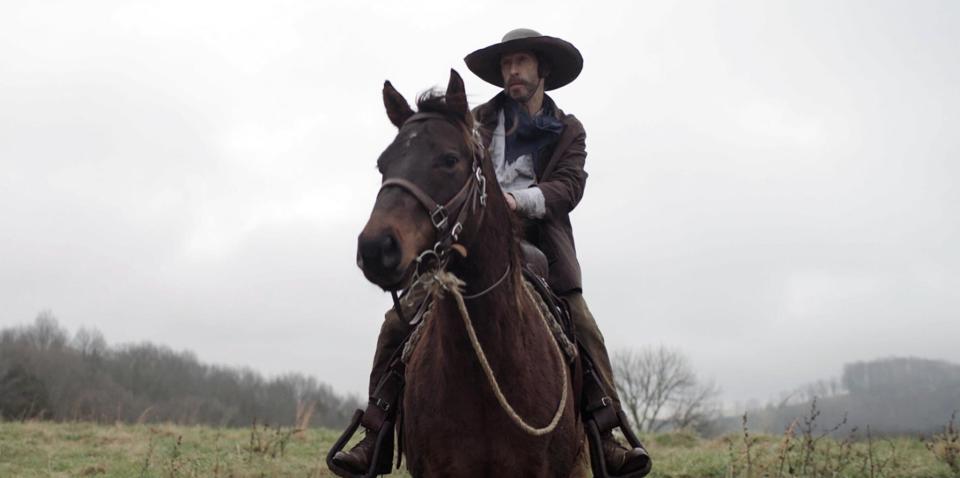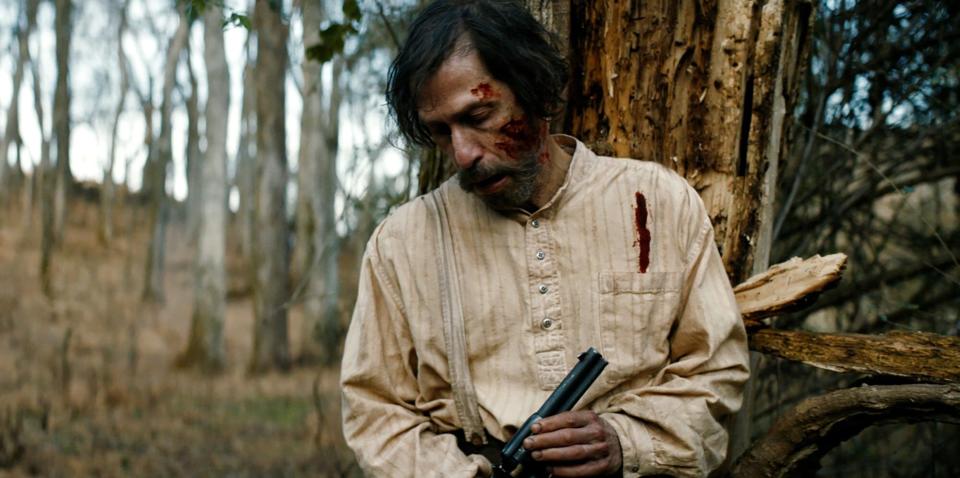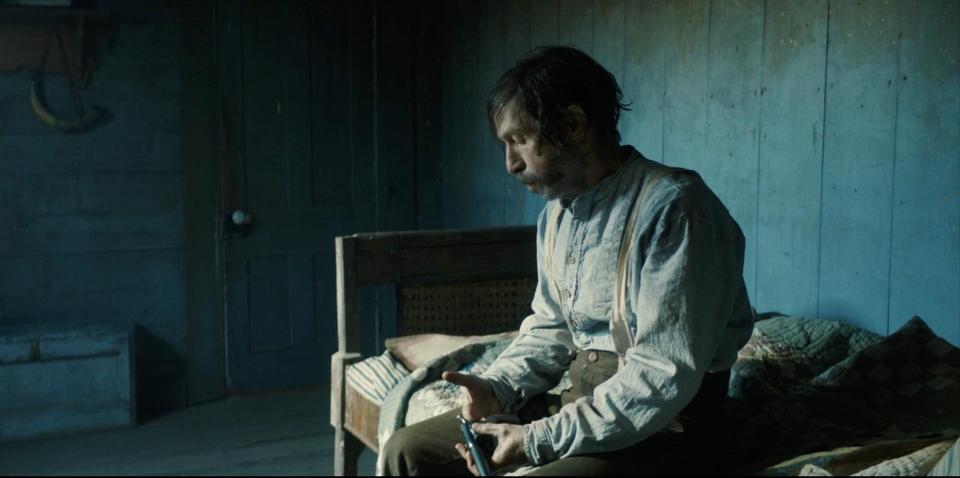Tim Blake Nelson talks stepping into the spotlight with Old Henry

- Oops!Something went wrong.Please try again later.
Tim Blake Nelson can tell what you're going to recognize him from based on your location. The 57-year-old character actor has built an unparalleled resume of cowboys, vigilantes, and oddballs, ranging from the unsettling to the goofily comedic. He doesn't get recognized very often, he says, but over the years, he's noticed patterns depending on what time zone he's in.
"In New York City, it's probably Holes or Incredible Hulk," the actor tells EW. "In the South, it's O Brother, Where Art Thou and then Buster Scruggs. In Los Angeles, it's tied between O Brother, Where Art Thou and Holes."
During the COVID-19 pandemic, however, the balance shifted. The Tulsa-born actor lives in New York City, and every time he got on the subway with a mask covering the bottom half of his face, he suddenly had more people approaching him than ever.
"I thought that was so funny because people started recognizing me, and I thought, 'How? I'm not that famous,'" Nelson says with a laugh. "I mean, that's ridiculous. My wife likes to say I'm minorly famous, and I think that's accurate."

Shout! Factory Tim Blake Nelson in 'Old Henry'
It wasn't until one fan pulled out his phone and showed him a picture of his masked Watchmen character, Looking Glass, that he realized: Not only was he more recognizable wearing a mask, but he also tended to wear the exact same outfits Wade Tillman wore on the HBO show. "I thought, Ah, got it,'" Nelson adds, laughing.
Now he's stepping into the spotlight even more. Nelson stars in Potsy Ponciroli's rugged western Old Henry, about an unassuming farmer and his son eking out a life in the Oklahoma Territory. Nelson plays the farmer, who finds himself drawn into a mysterious, bloody showdown over a bag of cash — and who might just be hiding secrets of his own.
With Old Henry out now, Nelson talks to EW about his starring role and stepping back into the world of Westerns.
ENTERTAINMENT WEEKLY: What was it about Old Henry that hooked you and made you want to be a part of it?
TIM BLAKE NELSON: My deepest connection immediately was that it was a story of a father and a son. I'm in the midst of raising three boys, although one is now 22, another 18, and another 16, so we're nearing the end of it. But fatherhood is incredibly important to me. I never wanted boys. I said to my wife 23 years ago, "If we have boys, they're going to be seditious little monsters who play the electric guitar and are disrespecting me." And they do all that, but I love it. In fact, one of them literally does play guitar, but it's jazz guitar and classical guitar. He started out playing electric rock guitar and then moved into classical jazz. Even then, when my nightmare seemed to be materializing in front of me, I felt like the luckiest man in the world to be raising these boys.
So I love that about the script. In particular, it's an examination of the opposing forces that can roil any parent: Do I protect my children from the world, or do I expose them to it so they can better deal with its challenges? Of course, the answer is you find a balance. But finding that balance is difficult, and it differs with each kid.
Gavin Lewis plays Henry's son. How did you want to find that balance working with him?
I had an immediate affinity with Gavin. The way he treated me cohered nicely with the relationship in the movie because in me, he saw a grizzled old veteran character actor. Maybe even only for his own amusement, he was asking me lots of questions about my career and working with this person and that person and what he should expect as he ventured into his 20s and 30s and 40s — because he's still a teenager. There's an element of that in the relationship that we had on screen. I also had the incredible blessing of my own son — my eldest, Henry, the one who plays guitar — being in the art department on Old Henry. So he was on set every day. He was the on-set dresser, so he was always around. That couldn't help but remind me of what's central to my life, which is being a dad.

Shout! Factory Tim Blake Nelson in 'Old Henry'
I love that: You're making a story about fathers and sons, and here's your actual son on set.
I remember telling Potsy, "Look, if you'll have him, I'd really like for my son Henry to work on the movie. I'll get him down there and pay for his hotel room, so he can work as a local." I know for a fact [Ponciroli] thought, "All right, well, he's just going to be lolling around the set, just like any lazy college kid." But Henry became a real favorite on the crew because he was there at daybreak and one of the last people to leave every day, and he worked his ass off.
You've acted in the Western genre before, but what was newest or most exciting about Old Henry?
Well, every character is something I've never done before. I don't like to repeat myself. So while others may say Delmar in O Brother, Where Art Thou isn't so different than Freighter in The Homesman, who isn't so different than Buster Scruggs, I see them as absolutely distinctive characters, and I worked hard to make each one a custom job. I don't ever want to repeat myself. So this, like any part, was as novel an experience as I can make it.
So yes, I was still on a movie set playing a part, doing take after take, but [it's] a completely different experience than playing Buster Scruggs. The challenges unique to this role, I guess, involved the transformation that occurs in the character over an entire film. Since that character is the lead character, the transformation needed to be gradual. Whereas in most films, I'm playing a supporting role and have less time, so the journey is more marked and distinguishable. In this movie, it needed to be surprising and slow, gradual. That was hard to modulate, and a very exciting challenge. I wanted for Henry by the end of the movie to be vastly different from the character he was at the beginning of the movie, and for the audience to never be able to name a single moment where the transformation happens.
You're right: On one hand, it's easier because you've got the luxury of more screen time, but that's also a tricky line to walk.
Right. And I had to let the writing lead me. That was another challenge because I wanted for this character to have a restraint that I've never deployed before, other than perhaps in Watchmen. Because like Wade Tillman in Watchmen, the character of Henry is desperate for people to know as little about him as possible.

Shout! Factory Tim Blake Nelson in 'Old Henry'
That can be hard to play, when you're so internal like that.
Yeah, and particularly hard for an actor who's mostly played characters who are outlandish, freakish, highly theatrical, and gregarious. [Laughs]
No spoilers, but there's a third-act gunfight in Old Henry that is particularly brutal and cathartic. How did you want to approach the physicality of that?
Well, I had a year between knowing I was going to play the role and actually doing it — partly that was because we pushed for COVID reasons. So I had the luxury of really being able to seep into the character. So for the first six months, I did what kind of amounted to table work, just researching the character, making a lot of decisions about how he might sound and move. But then I had the next six months working on the script with Potsy to develop the journey of the guy from page 1 to page 100. And then another two months to prepare physically with guns, and the riding, and working with all the tools, and all the physical stuff. I had to get in shape, not only to look like a farmer but also to do the active physical work of playing the role. So mostly it was just preparation, and that was a blast.
I'm at a point now, old codger that I am, that I like to show up on set having made all the decisions and having done all the prep work that I can beforehand, so there's nothing bothering me on the days we're shooting — except just working with my scene partner and our surroundings and giving the director what he or she wants.
That helps when you lay the groundwork, so you can show up on the day and allow for those moments of serendipity.
Precisely. And those inevitable moments, they need to happen while the camera is aimed at you. If you're worrying about the other stuff, it's unlikely they'll ever happen.
Related content:

